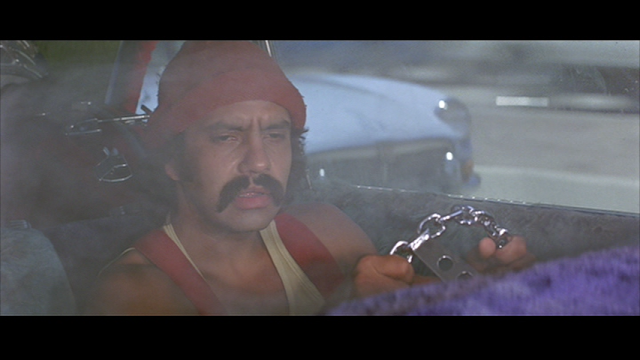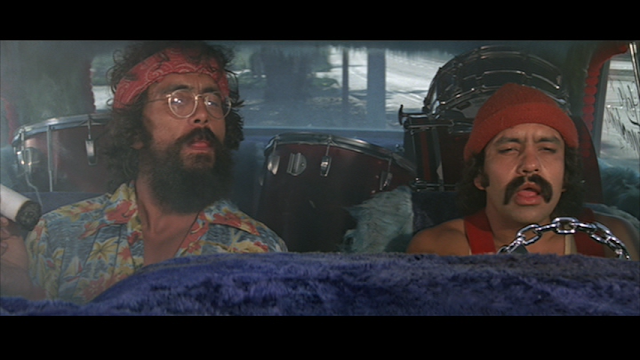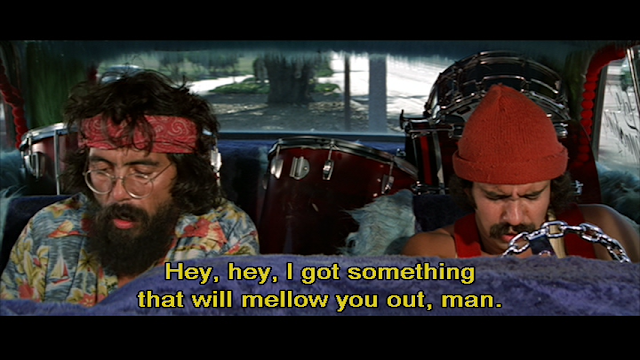Saturday, September 17, 2016
The Tear Collectors
Have you ever wanted to dial up a total stranger and just cry your freakin' heart out? No? Ha! Sure you haven't...neither have I. But if you ever did just full-on lose your shit on some poor unsuspecting shmoe, then you know how uncomfortable and embarrassing that can be. Right? And wouldn't it be easier to do it anonymously over the phone? Huh?! Hey, wait just a goddamn minute--this isn't about me! Oh, damn you! Damn it all!
The Fading Reverb: Up In Smoke (1978)
Skimming through the endless rabble of daytime talk shows
and the latest experiment in soul-sucking cultural nihilism passing itself for
reality TV, I came across something much funnier than I remember it being (or seemingly
having any right to be).
And for the record, let me make plain my pronounced disdain
for what they call “stoner humor” (or anything else operating on a fifth-grade
level while attempting to pass itself off as adult). I shudder at the very mention of it. Some of the absolute worst examples of modern
comedy fall under this label, but those are movies and TV shows I’d never deign to divulge here.
That said, UP IN SMOKE is a very funny movie, whether you
can relate to the subject matter or not.
I think this might say more about the dismal state of comedy today than
anything else, but this thing has aged exceptionally well.
From their first onscreen encounter, it's easy to see why Cheech and Chong became the 70's counterculture equivalent of Abbott and Costello, as their chemistry is as organic and natural as anything they might attempt to stuff into a ceramic pipe masquerading as a malevolent wizard.
Not long into the movie, the pair meet up quite by accident as Pedro (Cheech Marin) mistakes Anthony (Thomas Chong) for a female hitchhiker.
An honest mistake, really...
Anthony(?!)--hereinafter referred to, in the interest of christian harmony, as Chong--cunningly finagles his way into a ride by complimenting Pedro's radical eye for interior decorating, then the randy duo strike up a casual discussion somehow veering from a sober exchange concerning whether radical feminism and campus Marxism can freely coexist, to, "Hey, wanna smoke a joint, man?"
Producing a joint so impossibly huge that one is left wondering how many men were lost during its storied construction, Chong warns Pedro that the substance of which he is about to imbibe just might very well be some "heavy shit". Never one to shy away in the face of insurmountable odds, Pedro proudly regales Chong with tales of pot-conquests past, to which Chong curtly retorts, "better buckle up your seat belt, man".
"Am I driving okay, man?"
 |
| "That is a toothpick." |
Not long into the movie, the pair meet up quite by accident as Pedro (Cheech Marin) mistakes Anthony (Thomas Chong) for a female hitchhiker.
An honest mistake, really...
Anthony(?!)--hereinafter referred to, in the interest of christian harmony, as Chong--cunningly finagles his way into a ride by complimenting Pedro's radical eye for interior decorating, then the randy duo strike up a casual discussion somehow veering from a sober exchange concerning whether radical feminism and campus Marxism can freely coexist, to, "Hey, wanna smoke a joint, man?"
Producing a joint so impossibly huge that one is left wondering how many men were lost during its storied construction, Chong warns Pedro that the substance of which he is about to imbibe just might very well be some "heavy shit". Never one to shy away in the face of insurmountable odds, Pedro proudly regales Chong with tales of pot-conquests past, to which Chong curtly retorts, "better buckle up your seat belt, man".
 |
 |
| Chong- "Kinda grabs you by the boo-boo" |
"Am I driving okay, man?"
Wednesday, September 14, 2016
The Lonely Bull
Somewhere a lonely bull sits in his sadly furnished living room, staring at his TV set, unable to make sense of his life. He’s half-focused on a movie he’d seen long ago (which had only half-interested him then), but there is a strange, nagging feeling that just won’t go away. He hears children yelling from the courtyard and his mind flashes to the young family down the hall and for an instant has an epiphany so strong it leaves him shaken and confused.
For a moment, just a few seconds really, he feels himself
running with his own children on the beach as his lovely wife and youngest son
work on a sand castle a few yards away.
He is running, running fast but not too fast, and the sounds of laughing
children chase his every step. And he realizes they’re right behind him and he,
being the good dad he is, he’s supposed to let them win.
Tuesday, September 13, 2016
Chewing the Gristle
FAT CITY (1972; d: John Huston)
There are some movies that exist as if an affront to the
medium of filmmaking itself, sharply subverting the very notion of
entertainment (and storytelling). When
someone sits down to watch a movie like FAT CITY, what they are getting (or
being subjected to) has nothing to do with consideration for audience appeal or
expectations.
 |
| Stacy Keach, in perhaps the greatest role of his career. |
Legendary director John Huston--a former amateur boxer
himself--working from Leonard Gardner’s screenplay (based on Gardner’s own 1969
novel), wanted to make a true, unflinching look into the world of journeymen
boxers on the fringe, middling–hell, losing--the guys on skid row who exist
solely to make stars out of other men, and that is what he delivers.
 |
| The dire streets of Stockton, California, offer authenticity to spare. |
It’s a legacy of damaged men and their women, destitute and
discarded by society, the glory they live for but will never attain in the
fighting ring, and the brutal reality lying in wait on the other side of
that equation.
There is little joy to find in this world and only fleeting
glimmers of hope. And yet this movie is
so vivid and true, so skillfully crafted and acted, that it’s somehow so much
more than the bleak sum of its parts. It
is a fascinating, exhilarating sight to behold, an utterly real stroll through
society’s raw underbelly—and a major return to form for Huston in his twilight
years.
There is something like a love story here, between two drunk, desperate,
lonely souls, needing and finding one
another, but we know their story cannot end well, even as it’s just getting
started.
These aren’t people meant
for happiness. These are the lost,
still young by most standards, but already beholden to the wreckage of their
pasts. They are slaves to the rhythm of
their own destruction and a connection forged under these terms can only foster
more misery.
And there seems to be an unspoken awareness of
this, even as they press forward together.
When it’s over, there is no surprise, no histrionics, no ceremony…just a
consensual nod to the futility of a lost cause.
Much the same can be said for the boxing ring itself. When the dreams of glory give way to reality’s
devastation, when the fighters realize they’re just pawns in a game too big to
overcome, who can muster any surprise or resistance? It’s just another tough lesson in a long line
of them.
 |
| A young Jeff Bridges, still learning the ropes. |
 |
| Susan Tyrrell earned the only Oscar nomination of her career in the role she was, for better or worse, born to play. |
Not to be concerned with backbone, grit, determination, or
other manly preoccupations, the only heroics
here lie in the ability of its ne’er-do-wells to survive the onslaught. To take their licks, brush off, and move on.
That might sound like a tough steak to chew on, but along
this stretch of bar, for tonight at least, we’ll make due--trying not to
think about whatever tomorrow may bring.
Subscribe to:
Comments (Atom)




































